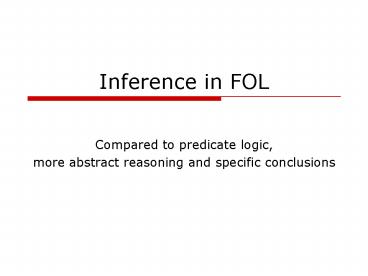Inference in FOL - PowerPoint PPT Presentation
1 / 17
Title:
Inference in FOL
Description:
... g., Dentist(Bill), Likes ... E.g., x Dentist(x) Likes(x, Candy) D. Goforth, COSC 4117, fall 2006 ... instantiation: substituting a reference to an object ... – PowerPoint PPT presentation
Number of Views:16
Avg rating:3.0/5.0
Title: Inference in FOL
1
Inference in FOL
- Compared to predicate logic,
- more abstract reasoning and specific conclusions
2
FOL knowledge bases
- Facts about environment involve statements about
specific objects - E.g., Dentist(Bill), Likes(Mary, Candy)
- General knowledge is mainly statements about sets
of objects involving quantifiers - E.g., ?x Dentist(x) ? Likes(x, Candy)
3
Deductive reasoningfrom general to specific
- how do quantified sentences get applied to facts?
- universal quantifier
- existential quantifier
- instantiation substituting a reference to an
object for a variable - inference conclusions entailed in KB
4
Instantiating Universal quantifier (UI)
- ?x p(x)
- statement is always true
- any substitution makes a legitimate statement
- format
- ?x p(x)
- subst( x/k, p(x) )
- (K is any constant or function from KB)
- p(K)
5
Instantiating Existential quantifier (UI)
- ?x p(x)
- statement is true for some object
- name the object for which it is true
- format
- ?x p(x)
- subst( x/k, p(x) )
- (k is a new constant, never used before
- Skolem constant)
- p(k)
6
Brute force reasoning
- use instantiation to create a propositional
logic KB - complete
- BUT...
- presence of functions causes infinitely large set
of sentences (Father(Al), Father(Father(Al)) - ? semi-decidable (disproofs never end)
7
Direct reasoning
- ?x man(x) ? mortal(x)
- man(Socrates)
- Substitute for instantiation
- subst( x/Socrates, man(x) ? mortal(x))
- man(Socrates) ? mortal(Socrates)
- modus ponens
- mortal(Socrates)
8
Substitutions for reasoning
- generalized modus ponens
- p1, p2, p3, (p1 p2 p3 )gt q
- subst( x1/k1, x2/k2.., q)
- Unification substitutions so that the sentences
are consistently instantiated
9
Substitutions for reasoning
- generalized modus ponens example
- Parent(Art,Barb),
- Parent(Barb,Carl),
- (Parent(x,y) Parent(y,z ) ? Grandparent(x,z)
- subst( x/Art, y/Barb,z/Carl, q)
- (Parent(Art,Barb) Parent(Barb,Carl )
- ? Grandparent(Art,Carl)
- Grandparent(Art,Carl)
10
Consistent substitutions
- unification algorithm p.278
- or variant here
- example
- ?x likes(Bill, x) (Bill likes everyone)
- ?y likes(y, Mary) (everyone likes Mary)
- subst( Bill/y, Mary/x, likes(Bill, Mary))
- makes two predicates identical
11
Application
- example
- ?x likes(Bill, x)
- ?y likes(y, Mary) gt trusts(y,Father(Mary))
- subst( Bill/y, Mary/x, likes(Bill, Mary))
- makes two predicates identical
- likes(Bill, Mary),
- likes(Bill, Mary) gt trusts(Bill,Father(Mary))
- ? trusts(Bill,Father(Mary))
12
Examples
- unify
- Likes(x,Art), Likes(Father(y), y)
- Art/y
- Likes(x,Art), Likes(Father(Art), Art)
- Art/y, Father(Art)/x
- unify
- Likes(x,Art), Likes(Bart, x)
- ? fails, cant subst x for Art and Bart
13
Examples
- unify
- Likes(x,Art), Likes(Bart, x)
- fails, cant subst x for Art and Bart
- BUT where did x come from?
- Art likes everybody ?x Likes(x, Art)
- Everybody likes Bart ?x Likes(Bart, x)
- standardize apart ?z0 Likes(Bart, z0)
- then Likes(Bart, Art) is OK with
- subst ( Bart/x, Art/z0 )
14
Unification algorithm
- Unify(L1, L2) // L1, L2 are both predicates or
both objects - If (L1 or L2 is variable or constant)
- if (L1L2) return (no subst required)
- if (L1 is variable) if L1 in L2 return fail
else return L2/L1 - if (L2 is variable) if L2 in L1 return fail
else return L1/L2 - return fail // both constants or functions
- // L1,L2 are predicates if we get to here
- If predicate symbols of L1,L2 not identical,
return fail - If L1,L2 have different number of arguments,
return fail - Subst
- For (i 1 to number of arguments in L1,L2)
- S Unify(L1.argumenti,L2.argumenti)
- if (Sfail) return fail
- if (S!)
- apply S to remainder of L1,L2
- Subst Subst U S
- Return Subst
15
Unification algorithm - examples
- Unify(L1, L2) // L1, L2 are predicates or
objects - If (L1 or L2 is variable or constant)
- if (L1L2) Art, Art x,x
- if (L1 is variable) if L1 in L2 return fail
else return L2/L1 - x, Father(x) x, Mother(y)
- if (L2 is variable) if L2 in L1 return fail
else return L1/L2 ltsimilargt - return fail Art, Bart
- // L1,L2 are predicates if we get to here
- If predicates of L1,L2 not identical Likes(x,y)
Brother(z,w) - If L1,L2 have different of arguments
Band(x,y,z), Band(t,v) - Subst
- For (i 1 to of args in L1,L2)
- S Unify(L1.argi,L2.argi) Likes(Bill,x)
Likes(y,Father(y)) - if (Sfail) return fail
- if (S!)
- apply S to remainder of L1,L2 Likes(Bill,x)
Likes(Bill,Father(Bill)) - Subst Subst U S
- Return Subst
16
Inference Reasoning methods
- Forward chaining
- Backward chaining
- Resolution
17
Resolution
- convert sentences to equivalent conjunctive
normal form (CNF) - apply resolution refutation































